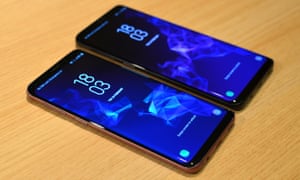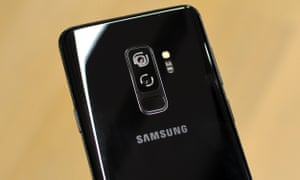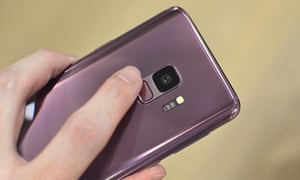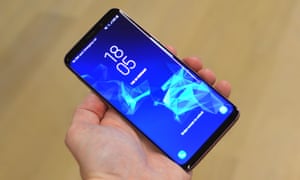
SAMSUNG GALAXY S9+ HAD AN AWESOME DISPLAY @ MWC Barcelonia 2018
check out the Specification.
Samsung Galaxy S9 and S9+ launched with first dual-aperture camera
Revamped all-screen design brings new AR emoji, stereo speakers, new 960fps slow-mo and potentially game-changing camera
Samsung has launched its latest flagship smartphone, the Galaxy S9, with a familiar all-screen design but its re-invented camera system could be a game-changer.
Announced at the Mobile World Congress in Barcelona on Sunday, the new top-end Android device comes in two varieties, following in the footsteps of last year’s popular Galaxy S8 in both look and feel. They have glass front and back, metal frames, curved edges, are water resistant, have wireless charging and a headphone socket.
The Galaxy S9 will have a 5.8in screen, while the larger S9+ will have a 6.2in screen. Both 8.5mm thick smartphones have curved screens, thin bezels, stereo speakers and reduced top and bottom non-screen elements compared to last year’s models. This year the S9+ will come with more memory and storage compared to the smaller S9, and will also have a dual-camera system similar to that fitted to Samsung’s larger Note 8, which includes a telephoto camera.
But it is the wide-angle camera fitted to both models that marks the biggest change for the smartphone. The 12-megapixel camera has the first variable aperture fitted to a smartphone, which physically switches between an f-stop of 1.5 for low-light photography and an f-stop of 2.4 for shooting outdoors.
“We were looking at how we can copy what the human eye can do automatically,” said Maxime Guirauton, marketing director for Samsung.
Guirauton said that the dual-aperture system provided the best of both worlds, allowing the camera to let in as much light as possible for shooting in dark environments, and providing a shallow depth of field for the pleasing bokeh effects often created artificially with software, while also making sure outdoor photography in good light doesn’t suffer.
Samsung also took a page out of Google’s computational photography book by developing a system that shoots 12 photos in three groups of four, combining them at the pixel level to weed out noise and boost detail.
The new camera also has a new super slow-motion function capable of shooting at an incredible 960 frames per second, turning a 0.2 second event into six seconds of normal film. Rivals such as Apple’s iPhone X and Google Pixel 2 shoot at a maximum of 240 frames per second. To make capturing that crucial 0.2 second event easier, the S9 is capable of detecting motion in a pre-defined area, recording from the split second that movement is detected.
Samsung has also taken a page out of Apple’s book with animated AR emojis, which instead of Apple’s animojis that map your facial expressions on to cartoon images of foxes, robots or even the poo emoji, the S9 will map expressions on to cartoon versions of your face, a bit like live Bitmoji. Users can have up to 18 different expressions with your choice of apparel. But unlike some competitor’s additional messaging functions, the emoji will work in your choice of messaging app.
Guirauton said: “You can share them with anyone because they’re gifs - they don’t have to be within Samsung’s ecosystem.”
Samsung has also improved its face and iris recognition system so that both biometric systems can be used at the same time, while the placement of the fingerprint scanner on the back - now below the camera module not along side it - has improved the ergonomics of the phone.
Whether Samsung has done enough to entice buyers of its previous smartphone to upgrade remains to be seen. The two phones look nearly identical, making the S9 a revision of the more radical S8 from 2017. But Samsung’s design and feature set are still likely to be considered class leading this year, at least compared to Android rivals and similarly priced models of the iPhone, discounting the more expensive iPhone X.
The Galaxy S9 and S9+ will ship with Android 8 Oreo and come in three colours, black, blue or purple. It will be available for pre-order from today, shipping on 16 March, costing from £739 without a contract or with contracts starting at £40 per month on Three, £44 per month on O2 and £53 on EE or Vodafone.





Post A Comment:
0 comments so far,add yours